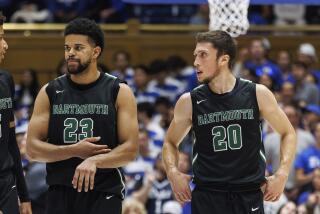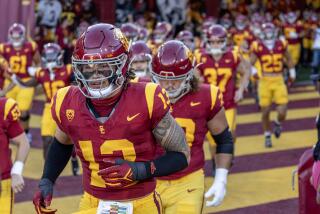New Status Might Aid Players : Hockey: The NHL’s labor dispute could officially become a lockout today, promoting alternative employment opportunities.
- Share via
Wayne Gretzky in line at the unemployment office?
According to California’s state unemployment insurance laws, workers who are locked out by management are eligible to apply for unemployment benefits. Although the NHL has deliberately called its work stoppage a postponement and has disputed the use of the term “lockout,” the league is expected to concede--perhaps as soon as on today--that the 17-day-old stoppage is a lockout.
In about 20 states, that means hockey players would be eligible to file for unemployment benefits.
Not that many would take advantage of that status. But the official declaration of a lockout might give them stronger legal footing if they want to pursue other temporary playing opportunities.
“Right now, the whole thing is based on (NHL officials) calling it a postponement,” said Ron Salcer, an agent who is looking into placing players with European clubs and in the International Hockey League. “The league (has maintained) it will be a full 84-game season. Once you say they’re locked out, if you get before a court of law, I think it will be different.”
From Oct. 1, when the season was scheduled to start, NHL officials insisted the stoppage was merely a delay and not a lockout because games would be made up later and wouldn’t be lost. A strange line of reasoning, say those familiar with labor law, and not very strong. It didn’t matter what the NHL called it, and it didn’t matter that there are no padlocks on arena doors. From the beginning, it has been, in effect if not in name, a lockout.
“Players are being told they can practice, but the only way they get paid is if there’s a game, and they’re not letting them play any games. I’ve done this for 17 years. That’s a lockout,” said William S. Waldo, who is a partner in the Los Angeles firm of Paul, Hastings, Janofsky & Walker and represents management in labor disputes.
“By the way, I’m not saying the management strategy is wrong or ill-conceived. I think it’s a good strategy that puts maximum pressure on the players.”
Said Al Latham, a partner in the same firm and a teacher of labor law at USC: “Legally, a lockout is when the employer does not allow employees to work. There does not have to be a notion that there are literally locks on the gate . . .
“You can certainly say it’s an unusual situation. People talk about lockouts and strikes, but I’m unaware of anything in between. The fact that they’re compensated only for playing and they’re not being allowed to play when they normally would be allowed to play, it certainly has the features of a lockout, let’s put it that way.
“But if a company says, ‘We’re shutting down the factory now and we’ll eventually resume regular hours (without lost pay), is that a lockout? The concept is different. It doesn’t quite fit the usual mode. Their argument is, ‘We’ll play the whole season, but we’re not going to do it now.’ . . . It’s novel.”
But now, the NHL’s last bit of pretense is about to disappear. With its original starting date long past and its second proposed opener wiped out Saturday because of a bargaining stalemate, games are certain to be lost. Players pledged to play and not strike if the NHL would not lock them out, but the NHL refused to let the season begin.
“Once they officially cancel games, a lot of things change,” Salcer said.
Players will have more time to pursue other jobs, but only a few are expected to do so because of insurance concerns. IHL clubs are reluctant to sign high-priced NHL talent, but the Kings’ Marty McSorley is negotiating with the Las Vegas Thunder.
Although Rene Fasel, the International Ice Hockey Federation’s president, said last week he won’t let European clubs sign idled NHL players, some say they will do so anyway. However, if the lockout is prolonged, players are expected to say they are being unfairly denied employment and challenge those obstructions.
Canceling games will also obligate NHL clubs to refund money to ticket holders. The league, in a memo sent last week, said it will provide refund guidelines by Nov. 1.
By delaying the change in terminology, not only did the NHL allow owners to hold onto that money a while longer, it gave the league a chance to solidify its bargaining stance. The labor lawyers interviewed also say the NHL kept the upper hand by rejecting the players’ Sept. 29 no-strike pledge.
“Generally, you see the traditional lockout where the workers are locked out of the plant. In effect, from what’s been said here, they’re able to come to the plant but there is no production taking place and they’re only paid for production,” said Linda Deacon, a management-side specialist in labor law in the Los Angeles office of the St. Louis-based Bryan Cave law firm.
“In effect, (management is saying), ‘We’re not going to be held hostage by you, you guys are being held hostage by us.’ ”
Accepting the no-strike pledge, she said, “is not going to help if what management really needs is concessions. They need to put pressure on the workers.”
Waldo agreed that NHL negotiators have devised a solid strategy.
“The players have offered status quo for a year (with their no-strike pledge). Accepting that proposal is totally in the interest of the players and accomplishes nothing,” he said. “My sense, with no inside information, is they will postpone (starting the season) until the players get ready to accept something very similar to what management wants.”
As in California, when a work stoppage in Massachusetts is termed a lockout, workers are eligible to file for unemployment. However, those who file for unemployment in Massachusetts and are offered a job must take that job.
Which could lead to some amusing scenarios if members of the Bruins applied for benefits.
“So if some guy picks up your bag at Logan (Airport),” Harry Sinden, the president and general manager of the Boston Bruins told the Boston Globe, “you might be saying, ‘Hi, Cam (Neely). What are you doing here?’ ”
More to Read
Go beyond the scoreboard
Get the latest on L.A.'s teams in the daily Sports Report newsletter.
You may occasionally receive promotional content from the Los Angeles Times.







